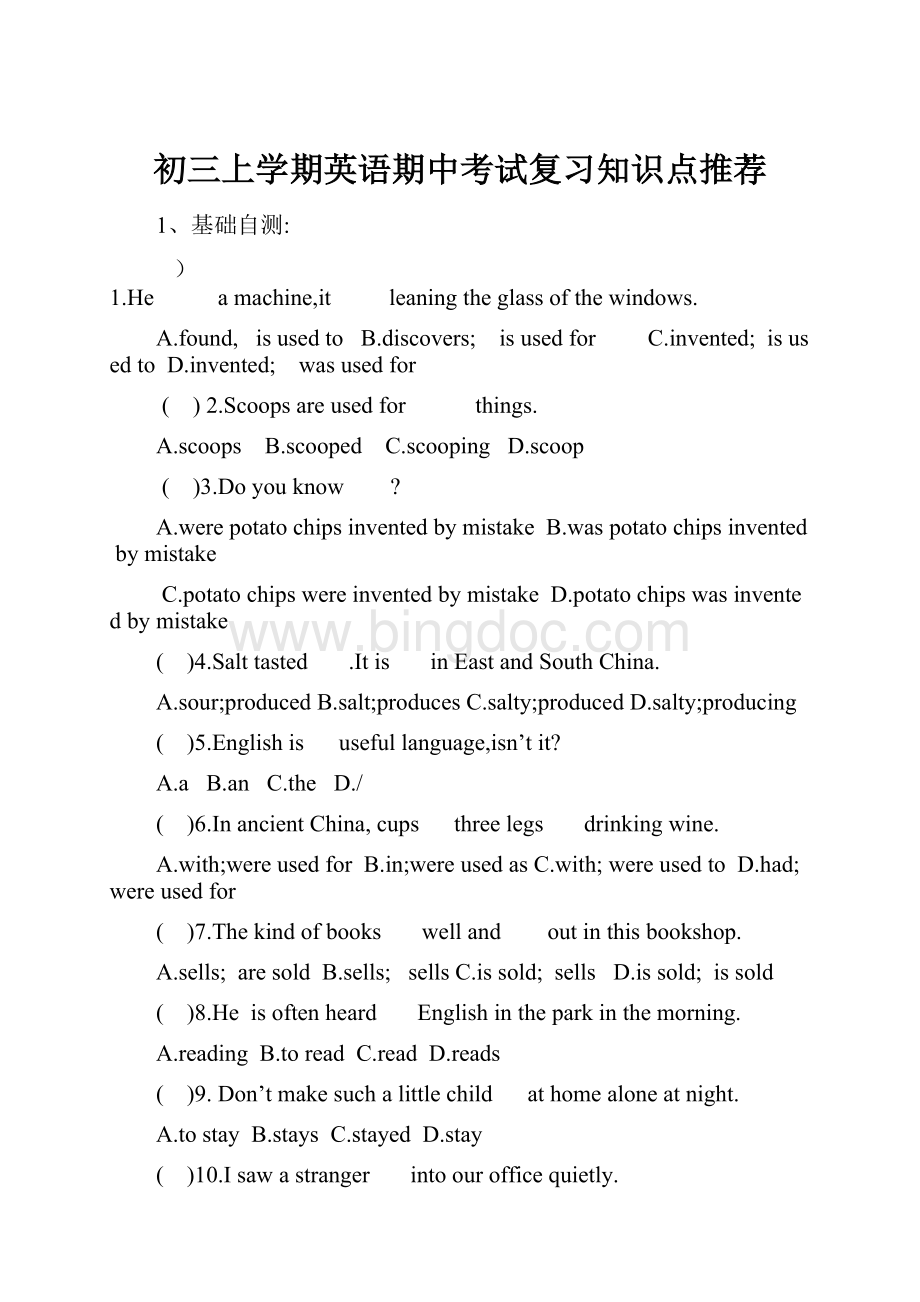初三上学期英语期中考试复习知识点推荐.docx
《初三上学期英语期中考试复习知识点推荐.docx》由会员分享,可在线阅读,更多相关《初三上学期英语期中考试复习知识点推荐.docx(30页珍藏版)》请在冰点文库上搜索。

初三上学期英语期中考试复习知识点推荐
1、基础自测:
)1.He a machine,it leaning the glass of the windows.
A.found, is used to B.discovers; is used for C.invented; is used to D.invented; was used for
( ) 2.Scoops are used for things.
A.scoops B.scooped C.scooping D.scoop
( )3.Do you know ?
A.were potato chips invented by mistake B.was potato chips invented by mistake
C.potato chips were invented by mistake D.potato chips was invented by mistake
( )4.Salt tasted .It is in East and South China.
A.sour;produced B.salt;produces C.salty;produced D.salty;producing
( )5.English is useful language,isn’t it?
A.a B.an C.the D./
( )6.In ancient China, cups three legs drinking wine.
A.with;were used for B.in;were used as C.with; were used to D.had;were used for
( )7.The kind of books well and out in this bookshop.
A.sells; are sold B.sells; sells C.is sold; sells D.is sold; is sold
( )8.He is often heard English in the park in the morning.
A.reading B.to read C.read D.reads
( )9. Don’t make such a little child at home alone at night.
A.to stay B.stays C.stayed D.stay
( )10.I saw a stranger into our office quietly.
A.came B.come C.coming D.to come
( )11.I don’t know if he here tomorrow?
If he ,please tell me.
A.will come,will come B.comes,comes C.will come,comes D.comes,will come
( )12.If he can Tom,he will the last match.
A.win,win B.beat,beat C.beat,win D.win,beat
2、知识梳理:
Unit1
一、知识点
1.Checkin:
在旅馆的登记入住。
Checkout:
在旅馆结账离开。
2.By:
①通过…..方式(途径)。
例:
IlearnEnglishbylisteningtotapes.
②在…..旁边。
例:
bythewindow/thedoor
③乘坐交通工具例:
bybus/car
④在……之前,到……为止。
例:
byOctober在10月前
⑤被例:
Englishisspokenbymanypeople.
3.how与what的区别:
how通常对方式或程度提问,意思有:
怎么样如何,通常用来做状语、表语。
what通常对动作的发出者或接受者提问,意思为什么,通常做宾语,主语。
1What…thinkof…?
How…like…?
2What…dowith…?
How…dealwith…?
3What…likeabout…?
How…like…?
4What’stheweatherliketoday?
How’stheweathertoday?
5Whattodo?
Howtodoit?
e.g.Whatdoyouthinkofthisbook?
=Howdoyoulikethisbook?
Idon’tknowwhatIshoulddowiththematter.=Idon’tknowhowIshoulddealwithit.
WhatdoyoulikeaboutChina?
=HowdoyoulikeChina?
Idon’tknowwhattodonextstep?
=Idon’tknowhowtodoitnextstep?
㊣Whatgood/badweatheritistoday!
(weather为不可数名词,其前不能加a)
㊣Whatafine/baddayitistoday!
(day为可数名词,其前要加a)
4.aloud,loud与loudly的用法:
三个词都与"大声"或"响亮"有关。
①aloud是副词,重点在出声能让人听见,但声音不一定很大,
常用在读书或说话上。
通常放在动词之后。
aloud没有比较级形式。
如:
Hereadthestoryaloudtohisson.他朗读那篇故事给他儿子听。
②loud可作形容词或副词。
用作副词时,常与speak,talk,laugh等动词连用,多用于比较级,须放在动词之后。
如:
Shetoldustospeakalittlelouder.她让我们说大声一点。
③loudly是副词,与loud同义,有时两者可替换使用,但往往
含有令人讨厌或打扰别人的意思,可位于动词之前或之后。
如:
Hedoesnottalkloudlyorlaughloudlyinpublic.他不当众大声谈笑。
5.voice指人的嗓音也指鸟鸣。
sound指人可以听到的各种声音。
noise指噪音、吵闹声
6.join加入某团体并成为其中一员attend出席参加会议或讲座
joinin与takepartin指参加到某项活动中去。
7.all、both、always以及every复合词与not连用构成部分否定。
其完全否定为:
all---none,both---neither,everything---nothing,everybody---nobody.
8.beafraidofdoingsth./sth.害怕beafraidofbeingalone
beafraidtodosth.害怕
beafraidthat恐怕担心,表示委婉语气
9.either:
①放在否定句末表示“也”
②两者中的“任一”
③either…or…或者…或者.…引导主语部分,谓语动词按照就近原则
10.a,an与序数词连用表示“又一”,“再一”。
例:
Pleasegivemeasecondapple.
11.havetrouble/difficult/problem(in)doing…..干…..遇到麻烦,困难
12.unless除非,如果不,等于“ifnot”本身就表示否定,引导条件状语从句,主句为将来时,条件状语从句用一般现在时表示将来。
例:
Mybabysisterdoesn’tcryunlessshe’shungry.
=Mybabysisterdoesn’tcryifsheisn’thungry.
Unlessyoutakemorecare,you’llhaveanaccident.
如果你不多加小心的话,你会出事的。
13.instead:
adv.代替,更换。
例:
Wehavenocoffee,wouldyouliketeainstead?
我们没有咖啡了,改喝茶好吗?
Itwilltakedaysbycar,solet’sflyinstead.
开车去要好几天呢,咱们还是坐飞机吧。
Tomwasill,soIwentinstead.汤姆病了,所以换了我去。
insteadofdoingsth.作为某人或某事物的替换
例:
Let’splaycardsinsteadofwatchingTV.
Wesometimeseatriceinsteadofpotatoes.
Givemetheredoneinsteadofthegreenone.
14.spoken口头的,口语的。
spokenEnglish口头英语
speaking讲话的,说某种语言的。
Speakingskills讲英语的能力
15.提建议的句子:
①What/howabout+doingsth.?
如:
What/Howaboutgoingshopping?
②Whydon’tyou+dosth.?
如:
Whydon’tyougoshopping?
③Whynot+dosth.?
如:
Whynotgoshopping?
④Let’s+dosth.如:
Let’sgoshopping
⑤Shallwe/I+dosth.?
如:
Shallwe/Igoshopping?
16.too…to太…而不能常用的句型too+adj./adv.+todosth.
如:
I’mtootiredtosayanything.我太累了,什么都不想说。
17.not…atall一点也不根本不如:
Ilikemilkverymuch.Idon’tlikecoffeeatall.
我非常喜欢牛奶。
我一点也不喜欢咖啡。
not经常可以和助动词结合在一起,atall则放在句尾
18.be/getexcitedaboutsth.===be/getexcitedaboutdoingsth.
===beexcitedtodosth.对…感兴奋如:
Iam/getexcitedaboutgoingtoBeijing.===
IamexcitedtogotoBeijing.我对去北京感到兴奋。
19.①endupdoingsth终止做某事,结束做某事如:
Thepartyendedupsinging.晚会以唱歌而结束。
②endupwithsth.以…结束如:
Thepartyendedupwithhersinging.晚会以她的歌唱而告终。
20.firstofall首先
.tobeginwith一开始
lateron后来、随
21.also也、而且(用于肯定句)常在句子的中间
either也(用于否定句)常在句末
too也(用于肯定句)常在句末=aswell
22.makemistakes犯错
mistakesb.for…把……错认为……
makemistakes(in)doingsth.在干某事方面出错
bymistake错误地;由于搞错
mistake---mistook----mistaken
如:
Ioftenmakemistakes.我经常犯错。
Imistookhimforhisbrother.我错把他认成了他的哥哥。
makeamistake犯一个错误如:
Ihavemadeamistake.
我已经犯了一个错误。
23.laughatsb.笑话;取笑(某人)
如:
Don’tlaughatme!
不要取笑我!
24.enjoydoingsth.喜欢做…乐意做…如:
Sheenjoysplayingfootball.她喜欢踢足球。
enjoyoneself过得愉快如:
Heenjoyedhimself.他过得愉快。
25.oneof+(the+形容词最高级)+名词复数形式…其中之一
如:
Sheisoneofthemostpopularteachers.她是最受欢迎的教师之一。
26.It’s+形容词+(forsb.)todosth.(对于某人来说)做某事…
如:
It’sdifficult(forme)tostudyEnglish.对于我来说学习英语太难了。
句中的it是形式主语,真正的主语是tostudyEnglish
27.practicedoing练习做某事如:
SheoftenpracticespeakingEnglish.她经常练习说英语。
28.decidetodosth.决定做某事如:
LiLeihasdecidedtogotoBeiJing.李雷已经决定去北京。
29.dealwith处理如:
Idealtwithalotofproblem.
30.worryaboutsb./sth.担心某人/某事
如:
Motherworriedabouthissonjustnow.妈妈刚才担心他的儿子。
31.beangrywithsb.对某人生气如:
Iwasangrywithher.我对她生气。
32.perhaps===maybe也许
33.goby(时间)过去如:
Twoyearswentby.两年过去了。
34.seesb./sth.doing看见某人正在做某事强调正在发生
seesb./sth.do看见某人在做某事如:
如:
Shesawhimdrawingapictureintheclassroom.她看见他正在教室里画画。
35.regard…as…把…看作为….如:
TheboysregardedAnnaasafool.这些男孩把安娜看成傻瓜。
36.toomany 许多 修饰可数名词 如:
toomanygirls
toomuch 许多 修饰不可数名词如:
toomuchmilk
muchtoo 太 修饰形容词如:
muchtoobeautiful
37.change… into… 将…变为…
如:
Themagicianchangedthepenintoabook.这个魔术师将这本书变为一本书。
38.withthehelpofsb.==withone’shelp在某人的帮助下
39.compare…to… 把…与…相比
如:
CompareyoutoAnna,youarelucky.你和安娜相比,你是幸运的。
Unit2
一、知识点
1.usedto过去常常做某事,暗指现在已经不存在的动作或状态.后跟动词原形.usedtodosth.
Thereusedtobe….(反意疑问句)didn’tthere?
否定形式为:
didn’tuseto或usedn’tto
疑问形式为:
Did…useto…?
或Used…to…?
be/getusedtodoingsth.习惯于,to为介词.
2.wear表示状态.=bein+颜色的词
puton表示动作.
dress+人给某人穿衣服.dresssb./oneself
haveon表示状态(不用于进行时态)
5.反意疑问句:
①陈述部分的主语为this,that,疑问部分主语用it;陈述部分主语用these,those,疑问部分用they做主语.
例:
Thisisanewstory,isn’tit?
Thoseareyourparents,aren’tthey?
②陈述部分是therebe结构,疑问部分仍用there
例:
TherewasamannamedPaul,wasn’tthere?
③Iam后的疑问句,用aren’tI
例:
IaminClass2,aren’tI?
④陈述部分与含有not,no,never,few,little,hardly,seldom,neither,none等词时,疑问部分用肯定.
例:
Fewpeoplelikedthismovie,didn’tthey?
但陈述句中若带有否定前缀或后缀的单词时,这个句子仍视为肯定,后面仍用否定.
例:
Yoursisterisunhappy,isn’tshe?
⑤陈述部分的主语若为不定式或V-ing短语,疑问部分主语用it.
例:
Tospendsomuchmoneyonclothesisunnecessary,isn’tit?
⑥陈述句中主语是nobody,noone,everyone,everybody等指人的不定代词时,疑问部分用they做主语;若陈述部分主语是something,anything,noting,everything等指事物的不定代词时,疑问部分用it做主语.
例:
Nobodysaysonewordabouttheaccident,dothey?
Everythingseemsperfect,doesn’tit?
⑦当主语是第一人称I时,若谓动为think,believe,guess等词时,且其后跟宾丛,这时疑问句部分的人称,时态要与宾语从句保持一致,同时还要考虑否定转移.
例:
Idon’tthinkhecanfinishtheworkintime,canhe?
⑧前面是祈使句,后用willyou?
(let’s开头时,后用shallwe?
)
6.beterrifiedof害怕的程度比beafraidof深.
8.nomore(用在句中)=not…anymore(用在句尾)指次数;
nolonger(用在句中)=not…anylonger(用在句尾)指时间.
11.afford+n./pron.afford+todo常与can,beableto连用.
例:
Canyouaffordanewcar?
Thefilmcouldn’taffordtopaysuchlargesalaries.
12.aswellas连词,不但…而且…强调前者.(若引导主语,谓动与前者在人称和数上一致
例:
Livingthingsneedairandlightaswellaswater.
生命不仅需要水,还需要空气和阳光.
Iaswellastheyamreadytohelpyou.
不仅是他们,我也愿意帮助你.
13.alone=byoneself独自一人.lonely孤独的,寂寞的.
17.①be/becomeinterestedinsth.对…感兴趣
②beinterestedindoingsth.对做…感兴趣
③showgreatinterestin在……方面产生极大的兴趣
④aplaceofinterest一处名胜someplacesofinterest
如:
Heisinterestedinmath,butheisn’tinterestedinspeaking
English.他对数学感兴趣,但是他对说英语不感兴趣。
⑤interestedadj.感兴趣的,指人对某事物感兴趣,往往主语是人
⑥interestingadj.有趣的,指某事物/某人具有趣味,主语往往是物
⑦aninterestingbook/man
18.害怕…beterrifiedofsth.如:
Iamterrifiedofthedog.
beterrifiedofdoingsth.如:
Iamterrifiedofspeaking.
21.spend动词,表示“花费金钱、时间”
①spend…onsth.在某事上花费(金钱、时间)
②spend…doingsth.花费(金钱、时间)去做某事 如:
Hespendstoomuchtimeonclothes.他花费太多的时间在衣着
Hespend3monthsbuildingthebridge.他花费了三个月去建这座桥。
payfor花费
如:
Ipay10yuanforthebook.我花了10元买这本书。
take动词有“花费”的意思 常用的结构有:
Ittake(s)sb.…todosth.如:
Ittakesmeadaytoreadthebook.
22.chatwithsb.与某人闲聊 如:
Iliketochatwithhim.
我喜欢和他聊天。
23.worryaboutsb./sth.担心某人/某事 worry是动词
beworriedaboutsb./sth.担心某人/某事 worried是形容词
如:
Don’tworryabouthim.不用担心他。
Motherisworriedaboutherson.妈妈担心他的儿子。
24.allthetime一直、始终
25.takesb.to+地